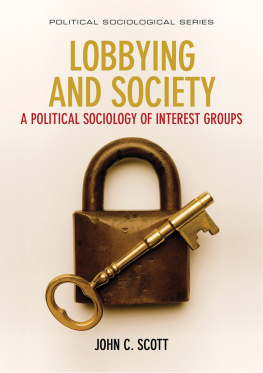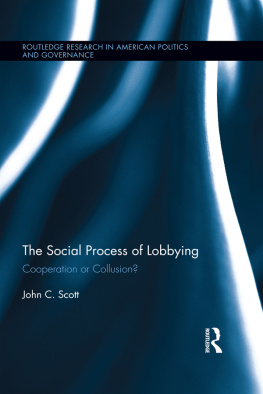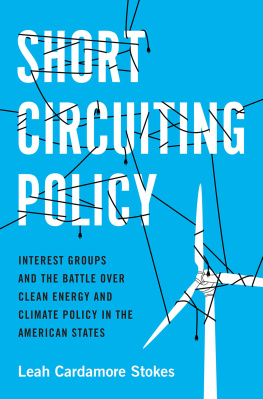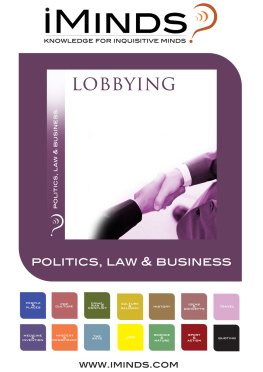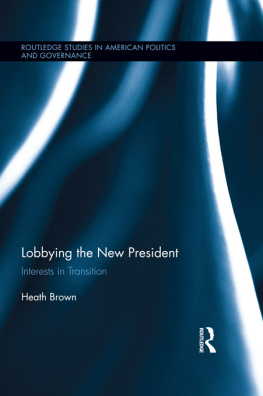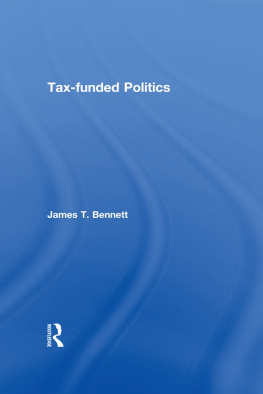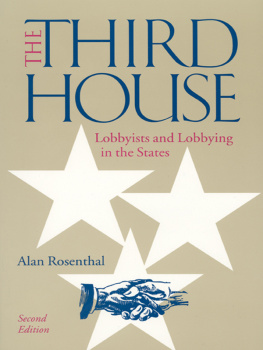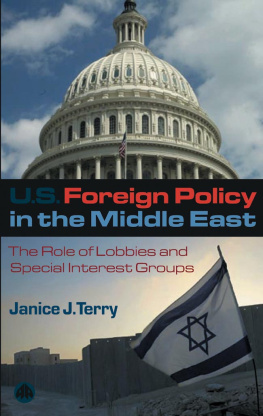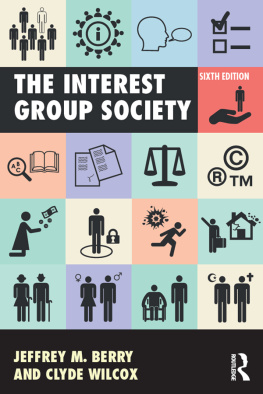Contents
Guide
Pages

Political Sociology series
William T. Armaline, Davita Silfen Glasberg, and Bandana Purkayastha, The Human Rights Enterprise: Political Sociology, State Power, and Social Movements
Daniel Bland, What is Social Policy?
Understanding the Welfare State
Miguel A. Centeno and Elaine Enriquez, War & Society
Cedric de Leon, Party & Society: Reconstructing a Sociology of Democratic Party Politics
Nina Eliasoph, The Politics of Volunteering
Hank Johnston, States & Social Movements
Richard Lachmann, States and Power
Sinia Maleevi, Nation-States and Nationalisms: Organization, Ideology and Solidarity
Andrew J. Perrin, American Democracy: From Tocqueville to Town Halls to Twitter
John C. Scott, Lobbying and Society: A Political Sociology of Interest Groups
John Stone and Polly Rizova, Racial Conflict in Global Society
Lobbying and Society
A Political Sociology of Interest Groups
John C. Scott
polity
Copyright John C. Scott 2018
The right of John C. Scott to be identified as Author of this Work has been asserted in accordance with the UK Copyright, Designs and Patents Act 1988.
First published in 2018 by Polity Press
Polity Press
65 Bridge Street
Cambridge CB2 1UR, UK
Polity Press
101 Station Landing
Suite 300
Medford, MA 02155, USA
All rights reserved. Except for the quotation of short passages for the purpose of criticism and review, no part of this publication may be reproduced, stored in a retrieval system or transmitted, in any form or by any means, electronic, mechanical, photocopying, recording or otherwise, without the prior permission of the publisher.
ISBN-13: 978-1-5095-1038-2
A catalogue record for this book is available from the British Library.
Library of Congress Cataloging-in-Publication Data
Names: Scott, John C., 1963- author.
Title: Lobbying and society : a political sociology of interest groups / John C. Scott.
Description: Cambridge, UK ; Medford, MA : Polity Press, 2018. | Series: Politcal sociology | Includes bibliographical references and index.
Identifiers: LCCN 2018004120 (print) | LCCN 2018024879 (ebook) | ISBN 9781509510382 (Epub) | ISBN 9781509510344 (hardback) | ISBN 9781509510351 (pbk.)
Subjects: LCSH: Lobbying--United States. | Pressure groups--United Stical culture--United States.
Classification: LCC JK1118 (ebook) | LCC JK1118 .S44 2018 (print) | DDC 324/.40973--dc23
LC record available at https://lccn.loc.gov/2018004120
The publisher has used its best endeavours to ensure that the URLs for external websites referred to in this book are correct and active at the time of going to press. However, the publisher has no responsibility for the websites and can make no guarantee that a site will remain live or that the content is or will remain appropriate.
Every effort has been made to trace all copyright holders, but if any have been inadvertently overlooked the publisher will be pleased to include any necessary credits in any subsequent reprint or edition.
For further information on Polity, visit our website: politybooks.com
Acknowledgments
Every writer owes a debt of gratitude to others who have helped move a project along, a fact that is doubly true in the case of this book. I want to thank my editor Jonathan Skerrett for his extreme patience and generous encouragement. Thanks are overdue to my wife Meredith for her positive views about completing this book when my own were not positive at all.
Introduction: A Social Orientation to Interest Groups and Political Life
Chapter aim: The goals of this introduction are (a) to orient the reader to the basic concepts of interest groups and lobbying; (b) to provide an overview of the role of interest groups in sociological analysis of politics; and (c) to provide a rationale for a sociological perspective on traditional interest group work.
Case study: From AUMF to the national security state
Can you, the individual, change public policy? On September 11, 2001, terrorists attacked the United States using airplanes to crash into the World Trade Center in New York City and the Pentagon in Washington, DC, killing 2,996 people in total. The terrorists were acting on behalf of Al Qaeda, an Islamic terrorist organization that had its base of operations in Afghanistan. In the days following the attacks of September 11, the US Congress passed the Authorization to Use Military Force (AUMF) in the form of a 60-word resolution:
That the President is authorized to use all necessary and appropriate force against those nations, organizations, or persons he determines planned, authorized, committed, or aided the terrorist attacks that occurred on September 11, 2001, or harbored such organizations or persons, in order to prevent any future acts of international terrorism against the United States by such actions, organizations or persons.
The AUMF was the political and legal basis for the invasion of Afghanistan but also has been the justification for an expansive series of military operations in Iraq, Syria, Africa, and the Arabian Peninsula. In 2008, Barack Obama campaigned on a promise to withdraw from the war in Iraq and reduce the US role in Afghanistan. When he left office in 2017, the US was ramping up its presence to fight ISIS across Iraq and Syria as well as stemming a resurgent Taliban in Afghanistan and confronting Islamist groups in Somalia and Niger, among other places.
Over the course of the decade following the passage of the AUMF, the various elements of the national security, defense, and homeland security apparatus developed and grew as US military operations expanded. As detailed in a Washington Post investigation, the growth in the national security apparatus is not just in terms of dollars but is literally physical:
- Some 1,271 government organizations and 1,931 private companies work on programs related to counterterrorism, homeland security and intelligence in about 10,000 locations across the United States.
- An estimated 854,000 people, nearly 1.5 times as many people as live in Washington, DC, hold top-secret security clearances.
- In Washington and the surrounding area, 33 building complexes for top-secret intelligence work are under construction or have been built since September 2001. Together they occupy the equivalent of almost three Pentagons or 22 US Capitol buildings about 17 million square feet of space.
- Many security and intelligence agencies do the same work, creating redundancy and waste. For example, 51 federal organizations and military commands, operating in 15 US cities, track the flow of money to and from terrorist networks.
- Analysts who make sense of documents and conversations obtained by foreign and domestic spying share their judgment by publishing 50,000 intelligence reports each year a volume so large that many are routinely ignored.
Today, it is hard to imagine how the 60-word resolution morphed into this bureaucratic behemoth, and no member of Congress certainly anticipated how the executive branch and associated policies would change when they voted for the AUMF. US military defense spending as a percentage of gross domestic product went from 2.9 percent in 2001 to a high of 4.7 percent in 2010 before dropping to 3.3 percent in 2016. Government researchers have estimated that the costs of the wars in Afghanistan and Iraq from 2001 through 2014 reached $1.6 trillion. That figure does not include any other defense spending.

